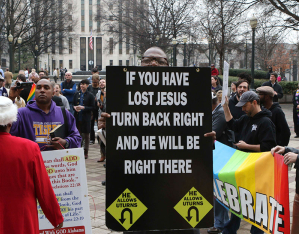
The Alabama Supreme Court put a stop to same-sex marriage on Tuesday when Chief Justice Roy S. Moore issued a 134 page order in an effort to uphold the state's ban on the unions which was approved by voters nine years ago. The state's highest court ordered probate judges to stop issuing marriage licenses to same-sex couples despite a February ruling by a Mobile federal court judge stating the opposite.
The Washington Post called the court defiant, and inanely compared it with the more than 50-year-old actions of former Gov. George Wallace who physically stood in the way of black students entering the University of Alabama campus following a court order giving them the right to do so.
Confusion remains the theme in the southern state's marriage battle, and parties on both sides are unsure of what the future holds.
"We are concerned about the family and the danger that same-sex marriage will have. It will be a devastating blow to the family, which is already struggling," said Joe Godfrey, executive director of the Alabama Citizens Action Program (ACAP), one of two conservative organizations that the court sided with.
Less than 20 years ago, the state's legislature adopted the Alabama Marriage Protection Act which states, "Marriage is inherently a unique relationship between a man and a woman and no marriage license shall be issued in the State of Alabama to parties of the same sex."
In 2006, voters ratified the Constitution of the State of Alabama with the Sanctity of Marriage Amendment.
On February 11, ACAP and the Alabama Policy Institute (API) filed a petition with the court to stop same-sex unions. The Court swiftly began to review answers and briefs in response to the petition, and issued a reply on February 18.
In his response, Judge E. Enslen requested that the Court "by any and all lawful means available to it, protect and defend the sovereign will of the people of the State of Alabama as expressed in the Constitution of the State of Alabama, as amended."
On Tuesday, this Court issued the order granting Judge Enslen's motion.
In the document, the Court stated, "Marriage has always been between members of the opposite sex. The obvious reason for this immutable characteristic is nature. Men and women complement each other biologically and socially. Perhaps even more obvious, the sexual union between men and women (often) produces children. ... In short, government has an obvious interest in offspring and the consequences that flow from the creation."
While the high court of the U.S. is anticipated to issue a sweeping ruling on same-sex marriage in June, the battle in Alabama is expected to continue.
"It is deeply unfortunate that even as nationwide marriage equality is on the horizon, the Alabama Supreme Court is determined to be on the wrong side of history," said Shannon Minter, a lawyer for the National Center for Lesbian Rights who helped overturn the state's ban.
On his Wednesday podcast, Albert Mohler - president of the Southern Baptist Theological Seminary - discussed the growing societal concern of being on the right or wrong side of history with regard to same-sex marriage.
"That's an interesting argument - it's one we've heard over and over again," he said. "But the argument being made that you are on the right side of history if you're for same-sex marriage is an argument that's had huge traction in the popular culture. Just look at how fast Hollywood tried to get on the so-called 'right side of history.' They want it known, they want it documented that they were there on the right side of history, even as many of them were by their own measure were on the wrong side of history very recently."
After Tuesday's ruling, Will Gilbert - who had planned to marry Brian Jernigan on March 14 in Jefferson County - expressed his disappointment in what he referred to as the South "taking two steps back."
But as Mohler stated, for Christians, being perceived to be on the correct side of history - or taking several steps back - is not their ultimate concern.
"We instead have the responsibility, as the apostle Paul told Timothy, to preach the word in season and out of season," he said. "We also have a responsibility to stay on the right side of the truth regardless of what might happen in history."






